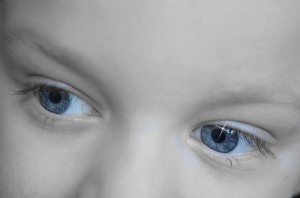Eye Contact and Autism: Reflecting on Your Agenda for Your Child

One of the first signs of autism in infancy is a lack of eye contact, and autism spectrum individuals may experience this difficulty as a result of neurological differences in visual processing.
Do you remember your parents telling you, “Look at me when I’m talking to you!” demanding you show them respect? Eye contact and autism is a controversial and complex issue. Therapists, educators, and parents often insist autistic people make eye contact with them. They assume that people cannot listen and understand what they are trying to say unless they are making eye contact. Since communication breakdown is a central issue to autism spectrum disorders, parents and professionals naturally feel that eye contact is an important first step to teaching. But anyone who has talked to autistic individuals understands that this issue is more complex than we realize.
…
